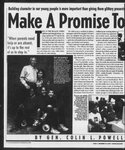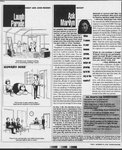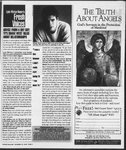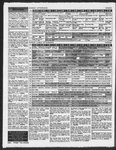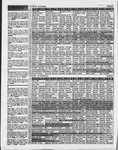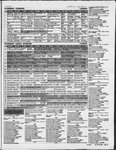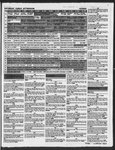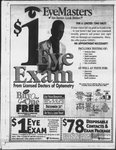| OCR Text |
Show ERPS STOP SSS SY BEIT SAWSER T BYU CRUMBLES JAZZ BEAT TIMBERWOLVES | J SPORTING WISHES USC comesbackin 70-67 win C-1 Missedthree-pointerlifts Utah C-1 Columnist Monson’s list C-1 Ghe Salt LakeGribiinie Utah’s Independent Voice Since 1871 Volume 261 Number 71 ©2000, The Salt Lake Tribune e 143 South Main Street, Salt Lake City, Utah 84111 SUNDAY, DECEMBER 24, 2000 Telephone numbers listed on A-2 Utah Trust Lands Pay Off CLOWN PRINCE Pianist-humorist Victor Borge died Saturday at age 91. When he was Andnotonly for schools; agency’s executives receive healthy annual bonuses 80, Borge said:“I neverhaveto get ‘up’ fora performance. The moment | walk on BY CHRISTOPHER SMITH © 2000, THE SALT LAKE TRIBUNE A decade ago, the permanenttrust fund Utah maintains for public schools stood at $37 million. Todayit is valued at $377 million. And administrators say higher salaries and hefty bonuses for senior executives are a big reason why. Records released to The Salt Lake Tribune by the independentstate agency that manages schooltrustlands in Utah show that during the past four years, five managers collected a total of $330,000 in “incentive performance” bonuses, School and Institutional Trust Lands Administration (SITLA) Executive Director David Terry took home abouta third of the the stage, no matter what my mood,if | have any regrets orfeel sick orin pain,all that disappears. That is whenthe bonus pool, mostrecently a $32,500 reward on top of his $90,812 annual salary. The base salaries ofthe five eo executives — the director, three assistant and the chief legal counsel — ol risen an average of47 percentin the past four years. Noneofthe salaries or bonuses is footed by taxpayers. SITLA runs on funds generated by the auction,sale, leasing and development of scattered parcels of land the federal governmentgranted Utah,at the time of statehood, to be managed and held in trust solely for the beneficiaries — grade schools, state universities and schools for the deafand blind. The Utah Constitution requires that only theinterests ofthe beneficiaries, not the public or state’s general welfare, be considered in 2000 Utahn of the Year ROCKY ANDERSON thinking and cutting political and ultural "i . swaths through city boundaries andtraditional comfort zones. Lov_ him orloathe him, during his initial year as mayorof the state’sfirst city, Anderson cogently forced Utah to confrontitself on assiduously avoided issues:antiquated liquor laws, Olympic symbolism, racial and sexual equality, the economically disadvantaged,religious domination, urban sprawl and corporate manipulation. Heserved jarring notice thathis city, on the verge of welcoming planet Earth,is a cultural stew.In a state thatoften takes itself too seriously and where it is a tenet to make one’s mark without making a corresponding fuss, Anderson worked to convince us that having fun is legal-and healthy. To be sure, Anderson’sfirst-year road was, well, quite Rocky. His first order ofbusiness senta police chiefpacking; later, he ticked off street cops with his defense ofan aide who had been cited for an infraction. He forbadecity employees from accepting free lunches orgifts. Staff cameandleft undera driven micromanager; reports ofclosed-door tantrums persist. The sacrosanct DARE program was axed, By executivefiat, discrimination on the basis ofsexual orientation was banned. Andhe popped off about decriminalizing marijuana. Noissue seemed too minute: serenuliptinns pedestrian flags, wandering grocery carts, more tables for sidewalk dining. . . Or too daunting: a better Olympics deal for venuecities, beer around the Medals Plaza, ordering Legacy See BONUSES,Page A-5 U.N. Approves Budget, Cuts U.S. Payments CheSaltLakeTribune hether you consider him a courageous voice in the wilderness or a mayoral Mad Hatter, Salt Lake City’s Rocky Andersonspentthe year 2000 frazzling nerves,jolting conventional ‘ trust land Mor than lfthland granted by Uncle Sam to Utah education beneficiaries — sections per every has be an in the past century,leaving 3.5 million acres under SITLA management. About 30 percent of all private land today in the state once was school trust property, including such landmarks as Temple Square in Salt Lake City. Stewardshipof these schooltrust lands has at times bordered on criminal, with a checkered pastof rigged land deals and mismanagement. In the mid-1980s, the “permanent” trust fund was raided in the wake of state budget cuts and liquidated. In 1990, Utah’s fund had Highwayplanners outofhis back yard,chaining a major departmentstore to its downtown location, helping lead a chargefor a sales-tax increase to expand public transit. Ortoo unthinkable:telling a mall developerto take a hike and campaigning for sensibleliquorlaws. Forthe most part, Anderson knew when it madesense to ease off. He quickly figured out, for example, the LDS Church’s Main Street Plaza andthe 2002 Winter Olympics are not going away. To continueto fight somethings only enhances the divisiveness. As mayorofUtah’s largest and most diverse city, the mercurial Anderson emerged as a popular spokesman for all Utahns whoperceive themselves disenfranchised. Hecastlight on lines ofdivision few will talk about publicly. Speaking up for minorities — be they raciai, cultural, economic,or religious — has long been on his front burner. Perhaps mostcrucially, Anderson is helping Utahns to recognize thefastest growing and most malignantdivideofall: Mormonvs. non-Mormon.It is a deteriorating situation sorely in need of reasoned dialogue and 2ist-century sensitivity — from ey eryone. Whether Rocky Anderson can movebeyond therole of symbolic championtoa bridgerof diversity gaps anda filler of cultural and political potholes remains to be seen,but his of the Year. Who were the runners-upfor 2000? Letter From the Editor has the names on A-2. Agreement may resolve deadlock over America’s $1.3-billion debt BY EDITH LEDERER UNITED NATIONS — The United Nations adopted the first major overhaul of its financing in more than two decades Saturday,cutting U.S.payments to the world body and shifting most of the financial burdento developing countries that have experienced economic improvement. Bleary eyed delegates from 189 countries — many now hoping to makeit home for holidays — wrapped up agreement on the budget reform package after South Korea dropped last-minute demands. ‘The General Assembly promptly approved the new system, passing resolutions for separate budgets for the United Nations’ day-to-day operations and its far-flung peacekeeping operations. When assembly president Hari Holkkeri of Finland gaveled the session to a close, there was loud applause —andarace to the doors. “Buried in this complex financial package is the first financial reform ofthe U.N. regular budgetin 28 years andthefirst time ever for peacekeeping,” said Richard Holbrooke, the exhausted but jubilant U.S. ambassador. Manycredited his personal lobbying ofreluctantandoften hostile delegates for the groundbreaking accord. The last time the U.S. portion of the regular budget was reduced was in 1972, when the ambassador was George Bush, Holbrookenoted. With a debt to the United Nations nowtotaling $1.3 billion, the United States has been repeatedly attacked by othercountries for not paying its dues. The U.S. Congress, bag r reform of the bloated U.N. bureaucracy, has passed legislation requiring that the U.S. share of the budget be substantially reduced before a substantial chunk of the arrears can be paid. On Friday, the United States won the battle to reduce its share of the U.N. budget the centerpiece ofthe U.N.financing overhaul —- after media tycoon Ted Turneroffered a $34 million one-time gift. Turner’s donation would cover the shortfall the U.S cutcreates in the main U.N. budgetin 2001. Under the deal, the U.S. share of the See ANNAN,Page A-6 WEATHER Snow over muchofthestate. B-8 UTAH Avalanche danger: Powder the Polar Bear keeps watch. 1 THE ARTS Meet Gus,the Capitol Theatre's — will ambassador. BUSINESS ‘Thelure ofsuccess in high-tech on the West Coast presents a family challenge, as some Utahns can attest. E-1 DAYBREAK Togetherness and the holiday spirit are reaching newlevels in some Utah neighborhoods. Ann Landers Astrology Births Book Reviews F4 F-12 Bs DS Nowhere to Go BY MICHAEL VIGH THE SALT LAKE TRIBUNE he good newswas that Dan Stohel’s wife and four children had survived the fiery inferno that destroyed their Magna home. ‘The bad news was the blaze had consumed all of their The newly family became a splintered band of vagabonds, moving from one house to another, some here, some there. After Dan’s wife, Amanda, was released from the University ofUtah Hospital, the Stohels spent a few weeks sharing a home with a West Valley City family. At first, the arrangementseemed perfect. While Dan worked at Utah State Prison, the family nursed Amanda, still in painful recovery from the burns she received on June 25 when she twice dashed through smoke and flames to save her four young stepchildren and three friends. Butafter a few trying weeks,the Stohels had enough.It was too difficult to share a home with another family. The four children moved back in with their biological mother while Amanda and Dan searched for a place to live. aa ccna ae iomace Dea geek verge go. Thatfirst eeee slept in the! Amanda cried from the pain nhahealing a wounds, Dan felt an overw! helming,sense ofhopeless: Left destitute by a fire, family must rely on generousfriends ness. They had nothing. No house, FROM no food, no belongings, no prospects. As he lay awake that night, Dan suelo remembered the words of his former next-door neighbor, Irma Gonzales, ASHES whohad once told him if the young family ever needed anything, she would help. The next day, Dan asked if the family could live in her basement. F She agreed and had another surA story in five parts prise: their stay would be rent-free. Overthe next few weeks, Irma cared for Amanda and prepared mealsfor the children. Things were looking up. Butthen, incredibly, the Stohels got more bad news. Irma was facing financial difficulties and needed to rent out her basementin a month. Again,the house hunting began.It was difficult to find a place they could afford. On Halloween, Dan went to his Mormonbishop to ask for help. Thebishop provided money forthe first month’s rent, and the next day the Stohels moved into an apartmentin West ValleyCity. The place was small — especially for a family of six. Fightin,a uahie dtentdates de hte ter. Troops ofcockroaches scampered everywhere. But Christys was coming and Danhadasecret: % ‘surener wi bums she sulted fescue fe bape children from a house fire that left them with nothing. was readying a special gift for his family. And generous strangers would have a surprise of their own. Tomorrow: Christmas Comes A |






































































































